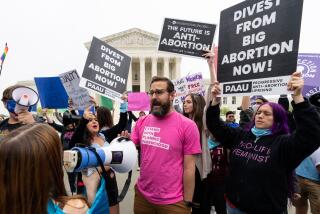U.S. Refusal to Aid Abortions Overseas OKd
- Share via
WASHINGTON — The Supreme Court, dealing another blow to abortion rights advocates, Monday affirmed the federal government’s right to deny foreign aid to overseas health care organizations that promote abortion as a means of family planning.
Without comment, the justices let stand a lower court decision affirming the legality of the controversial Ronald Reagan Administration policy that bars aid to foreign family-planning groups that either perform or promote abortions.
The ban, which affects more than $225 million spent annually on population control projects in the Third World, also denies federal funds to domestic family-planning organizations that assist abortion programs outside the United States.
The court’s action, in an appeal brought by the Planned Parenthood Assn. of America, had been expected in view of its 5-4 ruling May 23 on a similar issue. In that decision, the court upheld the government’s right to bar federally funded clinics in the United States from offering abortion counseling or telling pregnant women who want abortions how to obtain them.
But, although it came as no surprise, the court’s refusal to hear the Planned Parenthood appeal is significant because of the impact that it is likely to have on struggling family planning projects in the Third World. The Agency for International Development, which had imposed the ban, last year provided about 40% of all funds that overseas family-planning organizations received from foreign countries.
The court’s action affirmed that those organizations, and the domestic agencies that support them, cannot receive AID funding unless they promise not to use money from any source to “actively promote abortion as a method of family planning.”
The justices refused to review a lower court ruling that said the government did not violate the First Amendment by restricting the distribution of AID funds to foreign groups that promise not to counsel abortion in their family-planning programs.
Planned Parenthood’s lawyers argued that the policy, announced by the Reagan Administration at a 1984 population conference in Mexico City, violated the First Amendment by using “the immense leverage of AID funds” to prevent people from expressing views “with which the United States government disagrees.”
The appeal (Planned Parenthood Federation vs. Agency for International Development, 90-1169) said that as many as 250,000 women die every year from “botched” abortions in the Third World but that family planners whose programs rely on AID funds were being barred from giving advice about safe abortions.
Planned Parenthood added that it lost between $3 million and $4million in AID funding for 1991 because of its refusal to accept the restrictions.
The ban “cripples” Planned Parenthood’s ability to use “its own funds in other countries” to provide information about abortion, the appeal said.
In arguing for the government, Solicitor General Kenneth W. Starr said that the AID restriction is not unconstitutional but “simply a refusal to subsidize a particular activity.” Planned Parenthood, he said, “has no right to insist in court that a government program in which it does not wish to participate be changed into the type of program in which it would like to participate.”
In another action Monday, the high court moved to eliminate racial considerations from jury selections, ruling, 6 to 3, that the Constitution bars lawyers in non-criminal cases from excluding jurors on the basis of their race.
A similar ban has been in effect for criminal cases since 1986. The high court’s ruling Monday was in a case from Louisiana (Edmonson vs. Leesville Concrete Co., 89-7743).
“Racial bias mars the integrity of the judicial system and prevents the idea of democratic government from becoming a reality,” Justice Anthony M. Kennedy wrote for the majority. “To permit racial exclusion in this official forum compounds the racial insult inherent in judging a citizen by the color of his or her skin.”
At issue were the so-called peremptory challenges that lawyers may use to exclude candidates during the selection of a jury without having to justify their reasons for the exclusion.
The case involved Thaddeus Edmonson, a black construction worker who was injured in an accident in Ft. Polk, La.
Edmonson sued his employer, Leesville Concrete Co., for negligence and won. But, after receiving only $18,000 in damages from the jury of 11 whites and one black, he asked the U.S. 5th Circuit Court of Appeals to determine if the exclusion of two blacks from the jury violated the so-called Batson ruling--a 1986 case in which the Supreme Court said that race could not be considered in choosing juries for criminal trials.
The appeals court ruled that no such determination was needed because the Batson decision did not apply to civil suits. The high court on Monday disagreed and ordered further lower court hearings.
“If race stereotypes are the price for acceptance of a jury panel as fair, the price is too high to meet the standard of the Constitution,” Kennedy wrote.
Joining Kennedy in the majority were Justices Harry A. Blackmun, Thurgood Marshall, John Paul Stevens, Byron White and David H. Souter, the court’s newest member.
Dissenting were Chief Justice William H. Rehnquist and Justices Sandra Day O’Connor and Antonin Scalia.
Scalia wrote that, although the ruling might have “great symbolic value,” it could also prevent a minority defendant from seeking “to seat as many jurors of his own race as possible” at his trial. It could also have an “enormous” impact on the time and money that civil courts could be forced to spend to ensure that jury candidates rejected by lawyers have not been excluded because of their race, he wrote.
More to Read
Get the L.A. Times Politics newsletter
Deeply reported insights into legislation, politics and policy from Sacramento, Washington and beyond. In your inbox twice per week.
You may occasionally receive promotional content from the Los Angeles Times.










